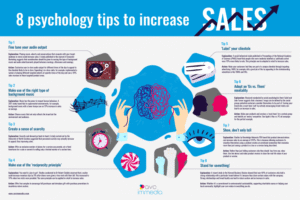In today’s competitive business world, every sales rep and business owner is armed with endless strategies to close deals and win over customers. But did you know your human brain is perhaps the best tool in your arsenal? Understanding and leveraging psychology can transform the way you connect with your clients.
This blog will explore five psychological tricks to help you close more deals and win more customers.
—
Why Psychology in Sales Matters

You may think that sales is all about product features, price tags, and catchy pitches. While those elements are crucial, psychology is the true driving force behind consumer behavior. Here’s a shocker: the human brain can process images in as little as 13 milliseconds. Yes, that’s faster than you can say, “Buy now!”
- According to the American Psychological Association: 70% of consumer behavior is dictated by emotion, not logic.
- A study by the Harvard Business Review showed that emotional connections drive four times the increase in customer engagement compared to rational connections.
So, let’s delve into these mind tricks with a sprinkling of humor and a whole lot of insight!
—
Trick 1: The Scarcity Principle
Ever hear someone say, “Only 3 left in stock!”? That phrase alone creates a sense of urgency. The scarcity principle is straightforward: people desire what they perceive to be rare or limited.
Why It Works in Sales
- Psychological Reactance: When people feel their freedom to choose is limited, they tend to want it more. Want a car that’s “one of only ten”? Who wouldn’t?
- Fear of Missing Out (FOMO): A whopping 56% of consumers consider scarcity a strong motivator to purchase. If they believe they might miss out, they’re more likely to act.
How to Implement in Sales
- Limited-Time Offers: Use phrases like “only available until midnight” to spike interest.
- Inventory Counts: Display how many items are left, and watch your sales skyrocket.
Like they say, Scarcity drives demand, it works even in the psychology of sales.
—
Trick 2: The Power of Reciprocity
Ever received a free sample that made you feel obligated to buy something? That’s the power of reciprocity – when one person does something for another, a feeling of indebtedness arises.
Why It Works in Sales
- Social Norms: Humans are biologically inclined to return a favor. When a potential customer receives something, it sparks a desire to reciprocate.
- Psychological Commitment: Once people engage with a product, they’re more likely to feel connected and make a purchase.
How to Implement it in Sales
- Free Trials: Let customers experience your product or service without a commitment.
- Add-On Gifts: Little surprises can lead to big returns.
Reciprocity in sales is like giving a dog a treat! Once he feels loved, he’ll bring you his favorite ball… or, in this case, his credit card!
—
Trick 3: The Anchoring Effect
Picture this: you walk into a store, see a $100 shirt, and next to it, a “luxurious” $500 jacket. Suddenly, that shirt seems like a steal! Welcome to the anchoring effect.
Why It Works in Sales
- Cognitive Bias: Our brains often rely on the first piece of information we see to make decisions. This “anchor” significantly influences our perception of value.
- Price Comparison: If consumers see high prices first, they’re more likely to believe lower prices are reasonable.
How to Implement it in Sales
- Price Comparison: Display higher prices alongside your offerings to make them appear more attractive.
- Bundling: Create packages that include high-value items to anchor perceived value.
Talking about prices: “If you think education is expensive, try ignorance – but you’ll probably get anchored to the wrong price!”
—
Trick 4: The Principle of Commitment and Consistency
Once people commit to something, they’re more likely to follow through. This principle is the same reason you sign up for a gym membership and then drag yourself there every week—at least until July.
Why It Works in Sales
- Self-Perception: People want to view themselves as consistent. Once they commit verbally or even through a small action, they are more likely to stick to a bigger commitment.
- Social Validation: If your friends are leveraging your product, you want in on the action too. It’s like a trendy restaurant—if everyone’s talking about it, odds are, you want to try it.
How to Implement it in Sales
- Introduce Small Commitments: Have customers fill out a quick survey or attend a webinar before diving into a purchase.
- Public Commitment: Encourage customers to share their experiences on social media—this creates a community that bonds over the product.
—
Trick 5: The Use of Social Proof
Humans are pack animals for a reason. Social proof leverages this inherent trait—seeing others buy a product makes it seem more desirable.
Why It Works in Sales
- Bandwagon Effect: The more people that express a positive experience with a product, the more likely others are to consider it.
- User-Generated Content (UGC): Online reviews can sway customers’ opinions, as they trust other consumers more than marketing materials.
How to Implement it in Sales
- Customer Testimonials: Ask for feedback and testimonials from customers who has made used of your products. Take a screenshot and post them on your social media handles, this creates a sense of authenticity and makes people trust in you and your products.
- Influencer Collaborations: Find influencers who align with your brand—if they endorse you, their followers will take heed.
A Quirky Observance
Social proof is like a musical flash mob; if one person starts dancing in a square, soon everyone’s spinning—considering this works much better when it comes to products!
—
FAQs
Q1. How do I measure the effectiveness of psychological tricks in sales?
A: You can track sales metrics like conversion rates, average order value, and customer retention pre-and post-implementation of these tricks to gauge effectiveness.
Q2. Can I use these psychological tricks in every industry?
A: Yes! While the application might differ, psychology in sales is vast and can benefit virtually any business, from retail to B2B services.
Q3. Are there any potential drawbacks to using psychological tricks?
A: If misused, these tricks can backfire, leading to customer distrust. Always prioritize ethical marketing practices.
Q4. How do I ensure that I’m using these tricks ethically?
A: Being transparent about deals, providing real value, and focusing on genuine customer relationships will help you maintain ethical standards.
Q5. How often should I implement these tricks?
A: It’s wise to experiment with a combination of these strategies over time. Monitoring your results will help you discover what resonates most with your audience.
—
In conclusion, understanding these psychological tricks can lead to closing more sales and winning more customers. Sales isn’t just about numbers; it’s about tapping into the nuances of human behavior. So get out there, apply these principles, and remember: in the grand game of sales, your mind is your most valuable weapon!
Now go forth, and may your closing rates soar higher than your coffee intake during morning meetings!









da83m7
0zjvp8
45q7ip
ch8nc9